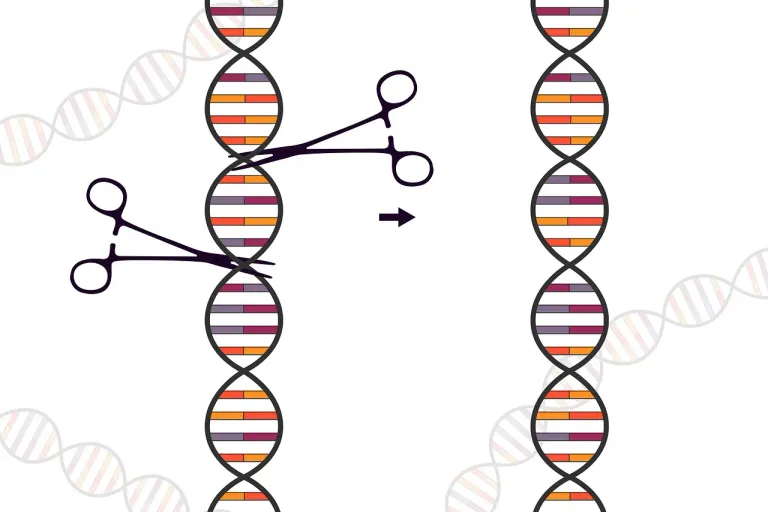CRISPR-Cas9: Editing Life's Code, Ethical Dilemmas, and Beyond.
In the realm of modern science, there are few discoveries that have captured our attention and ignited debates as much as CRISPR-Cas9 gene editing. This incredible technology has ushered in a whole new era where we, as humans, have the power to carefully edit the very code of life. So, let's dive into an engaging conversation where we explore the impact, ethical considerations, and the exciting possibilities that come with the CRISPR-Cas9 gene-editing revolution.

The CRISPR-Cas9 Blueprint
Before we delve into the complexities of CRISPR-Cas9 gene editing, let's take a moment to understand the fundamental principles behind it. CRISPR, which stands for Clustered Regularly Interspaced Short Palindromic Repeats, and Cas9, which is short for CRISPR-associated protein 9, are like the Swiss Army knives of molecular biology. They were initially discovered as part of bacteria's natural defense mechanism. Scientists have been able to take this bacterial defense system and turned it into a precise genetic editing tool, in other words, repurposing a tool meant for one job to do an entirely different task with incredible accuracy. With CRISPR-Cas9, we can effectively cut and paste specific genes within the DNA of almost any living organism, like a genetic cut-and-paste feature, just like editing a text document, but instead, we're editing the very code of life.
Battling Genetic Diseases
One of the most promising aspects of CRISPR-Cas9 is its potential in the fight against genetic diseases. We're on the cusp of potentially eradicating conditions like sickle cell anemia and cystic fibrosis by precisely adjusting the genes responsible for these disorders. However, this commendable pursuit brings to us significant ethical considerations, especially when contemplating alterations in human germline cells – the very cells that transmit our genetic heritage to future generations. Therefore, while the idea of eliminating genetic diseases is compelling, we must thoughtfully ponder the ethical consequences of modifying the genes that will be passed down to our progeny. It's a delicate balance between scientific advancement and ethical responsibility.
Also, the ability to tamper with the very essence of life raises some big ethical questions. Should we be altering human genes to make us smarter or stronger? And what about when we start changing the genes of plants and animals to suit our needs? It's like trying to find the right balance between making progress in science and being responsible about it, a bit like walking on a tightrope.
Beyond Humans - The Environmental Impact
CRISPR-Cas9 isn't limited to only humans; its influence stretches far beyond. It holds the promise of transforming the way we do agriculture and protect our environment. Scientists are actively researching ways to use gene editing to create crops that can survive and thrive even in harsh drought conditions. They're also looking at how to keep troublesome invasive species in check and, believe it or not, there's talk of bringing back animals and plants that have vanished from our world. But, as exciting as all this sounds, we must also be mindful of the potential consequences for our environment. It's a bit like playing with a giant puzzle – you might solve one part, but it can affect the whole picture. We need to be cautious and consider the big picture when we start making these grand changes to nature.
Who Owns the Recipe?
The legal complexities surrounding CRISPR technology make us to wonder who should have the rights to control something as fundamental as the building blocks of life. And it's not just about the legal side; we also worry about whether this amazing tool will be available to everyone or just a chosen few. We have to make sure that CRISPR becomes something that can benefit everyone. Balancing the legal aspects and ensuring access for all is a puzzle we need to solve.
Conclusion: Navigating the CRISPR-Cas9 Gene-Editing Revolution
The CRISPR-Cas9 gene-editing revolution offers significant progress, but it comes with challenges. As we deal with the ethics, environmental concerns, and legal issues related to this technology, we need to be careful and fair in how we use it. We have the ability to change the genetic code of life, and how we do this will shape the future for humanity and our world. The CRISPR-Cas9 revolution is more than just a scientific advancement; it's a deep journey into ethics and philosophy that requires all of us to make wise and responsible choices together.
Reference and further Understanding:
Thanks for reading
Thanks for your contribution to the STEMsocial community. Feel free to join us on discord to get to know the rest of us!
Please consider delegating to the @stemsocial account (85% of the curation rewards are returned).
Thanks for including @stemsocial as a beneficiary, which gives you stronger support.